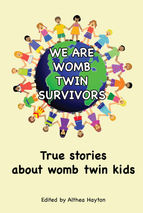

Parents, guardians and other significant adults
Here are some examples of the questions that parents ask
* Will my child be badly affected by the loss of their twin?
* Is my child behaving normally?
* Will I have to treat this child differently from my other children?
We have a lot more to learn, but we already know two important things about young womb twin survivors:
* They already have a deep sense of the presence and absence of their twin.
* Their feelings and behaviour are normal - for a womb twin survivor, that is.
When a child is a womb twin survivor
A womb twin survivor is the sole survivor of a twin or multiple pregnancy. That means a pregnancy begins with two babies but ends up with just one. The twin may die at any stage of the pregnancy - even up to the time of birth.
As the psychological difficulties that womb twin survivors face are being more widely discussed, and all kinds of theories are being aired, some parents are beginning to worry.
Anna wrote: "Simon, my 3-year-old is a surviving twin. When the placenta came out the doctor found a dead identical twin. I was recently told that there have been studies done that show some cases of the living child taking on the dead one's personality. My son is like two people, one way one minute and completely different the next. I want to know if this is something I need to worry about."
Should the parents worry?
It is now known from several studies that many surviving twins become distressed at some point in life, often in adolescence, but also some surviving twins are not at all distressed.
Researchers have yet to understand why this is. It seems that the loss of a fraternal twin is less traumatic than the loss of an identical twin.
The deep bond between twins, forged in the womb, is strongest between identical twins. Identical (monozygotic) womb twin survivors do seem to be the most likely to be distressed by their pre-birth experience.
What can parents do to help?
There is a lot that parents can do: research seems to indicate that if an individual knows for sure from the beginning that they once had a twin, that does become part of who they are. Then they understand their feelings better if they do get upset at any time. They can know they are responding perfectly normally to the genuine loss of their "other half".
A loving family and lots of encouragement and love seems to help a great deal, so in many cases a surviving twin will grow up with little more than a tendency to moodiness.
The loss of a twin, like any major event taking place during pregnancy, is worth keeping in mind as a potential effect (either positive and negative) on your child's development as an individual.
The science of pre-birth psychology is now well-established and we can be sure that our time in the womb does much to shape our personality in born life. Womb twin survivors are a particularly interesting case in point.
My child is very sensitive to atmosphere
My child does not like to sleep alone in the dark
My child is unusually aware of how people are feeling
My child has a rich, creative imagination
My child talks a lot about death and dying
My child loves animals and yearns for a pet
My child is different from other children
My child seems to have “been here before”
My child has an imaginary friend
My child is interested in spirituality
My child often seems lost and alone
My child is hypersensitive
Typical characteristics include:





